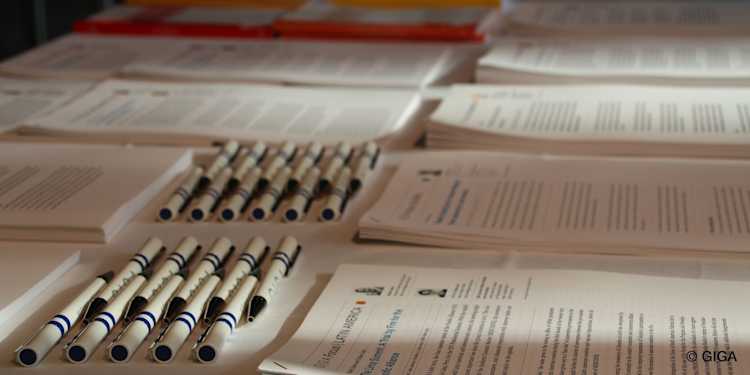- Home
- Publications
- GIGA Focus
- Turkey and the Arab Revolt: Rise or Decline in Regional Politics?
GIGA Focus International Edition English
Turkey and the Arab Revolt: Rise or Decline in Regional Politics?
Number 4 | 2011 | ISSN: 1862-3581
On 20 September 2011, at a meeting with U.S. President Barack Obama, Turkish Prime Minister Recep Tayyip Erdoğan called once again for an end to the regime of Bashar al-Assad in Syria. It was not until after the failure of the most recent Turkish mediation initiative on 9 August 2011 that Ankara began to officially call for regime change in Damascus.
Analysis
The Arab revolt has been changing the regional order in the Middle East since the end of 2010 and, furthermore, has influenced the potential of individual states to move up or down the ladder in regional politics. Under the AKP administration of Prime Minister Erdoğan, Turkey presents itself on one hand as a role model for transitioning Arab countries, but on the other hand its regional policy is marked by inconsistencies.
Turkey’s Middle East policy under the AKP is dictated by two main sets of goals, one dealing with economic and trade expansion and the second with soft power generation. But as the first set of goals requires stability and necessitates cooperating with authoritarian regimes, while the second set of goals, manifested in Erdoğan’s populist rhetoric, has continued to produce instability, the contradictory nature of those goals was evident even before 2011.
At the beginning of the Arab revolt, the Turkish government advocated for an end to the Mubarak regime in Egypt. In regards to Libya, however, Ankara conducted itself quite a bit more carefully due to its close economic ties with Libya, the Turkish government distancing itself only over time from Qaddafi.
Syria represents the biggest political challenge in the region for Turkey. With a two pronged strategy of making direct offers to Assad while simultaneously courting parts of the opposition, Turkey was able to keep many different communication channels open with the country until August 2011.
In the big picture, the alleged “skittishness” of Turkey’s regional policy could also be viewed as a largely successful series of adaptations to the transformation processes brought about by the Arab revolt. Thanks to this pragmatism and Erdoğan’s populism, Turkey will probably occupy a prominent position in the Middle East, at least for a short time.
Footnotes
Regional Institutes
Research Programmes
How to cite this article
Bank, André (2011), Turkey and the Arab Revolt: Rise or Decline in Regional Politics?, GIGA Focus International Edition English, 4, Hamburg: German Institute for Global and Area Studies (GIGA), http://nbn-resolving.de/urn:nbn:de:0168-ssoar-289011
Imprint
The GIGA Focus is an Open Access publication and can be read on the Internet and downloaded free of charge at www.giga-hamburg.de/en/publications/giga-focus. According to the conditions of the Creative-Commons license Attribution-No Derivative Works 3.0, this publication may be freely duplicated, circulated, and made accessible to the public. The particular conditions include the correct indication of the initial publication as GIGA Focus and no changes in or abbreviation of texts.
The German Institute for Global and Area Studies (GIGA) – Leibniz-Institut für Globale und Regionale Studien in Hamburg publishes the Focus series on Africa, Asia, Latin America, the Middle East and global issues. The GIGA Focus is edited and published by the GIGA. The views and opinions expressed are solely those of the authors and do not necessarily reflect those of the institute. Authors alone are responsible for the content of their articles. GIGA and the authors cannot be held liable for any errors and omissions, or for any consequences arising from the use of the information provided.







